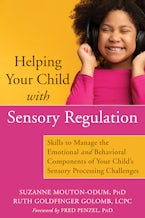Have you ever been working with a child and you are doing the appropriate evidence-based intervention, but progress is slow or nonexistent? Consider that the child might be struggling with sensory regulation problems or sensory dysregulation (SD); SD is oftentimes overlooked and can be the missing piece of the puzzle in treatment. SD can look like a variety of anxiety disorders—phobias, panic disorder, obsessive-compulsive disorder (OCD), or oppositional defiant disorder (ODD), to name a few. When there is an underlying sensory issue that gets missed, therapy derails, and you, the child, and the child’s parents can get frustrated.
What to do?
Ask the child about their sensory experience, e.g., “What about the lunchroom do you not like?” or “What does your body feel like when you hear the fire alarm?” Be on the lookout for answers that involve smell, sound, taste, texture, or visual concerns/dislikes—kids who get overstimulated by sensory input behave in very strange ways that can appear confusing without this information.
How to manage sensory dysregulation?
If the child exhibits some sensory dysregulation, switch the focus from straight “exposure,” which will likely result in treatment failure or even flat-out refusal by the child, to sensory soothing. Help them to understand their sensory preferences and use those to help them approach the difficult situation. If a child can’t go into the lunchroom due to the smells and sounds present there, try asking them to put a pleasing essential oil under their nose to combat the smell, suggest using noise-canceling earplugs while in the room, or have them bring a soothing fidget toy to lunch to reduce negative sensations. Your exposure work will be much more successful if you work with their nervous system, rather than against it!
Suzanne Mouton-Odum, PhD, is a licensed psychologist and expert in treating children with anxiety disorders, behavioral disorders, and sensory-based issues since 1995. She holds faculty positions at both Baylor College of Medicine, and the University of Houston. She is author of four other books, and director of Psychology Houston, PC in Houston, TX.
Ruth Goldfinger Golomb, LCPC, is a senior clinician, supervisor, and codirector of the training program at the Behavior Therapy Center of Greater Washington, where she has worked for more than thirty years. She specializes in the treatment of anxiety disorders in children and adults, and has conducted numerous trainings, workshops, and seminars on these topics.



